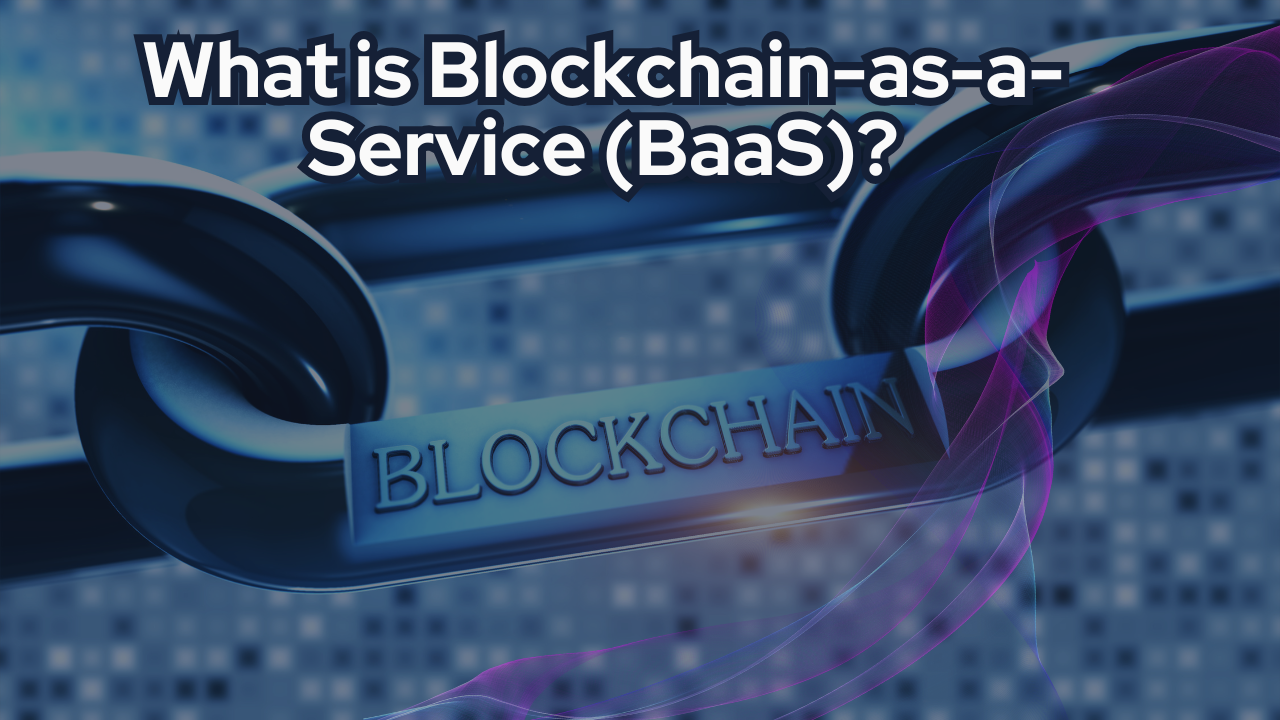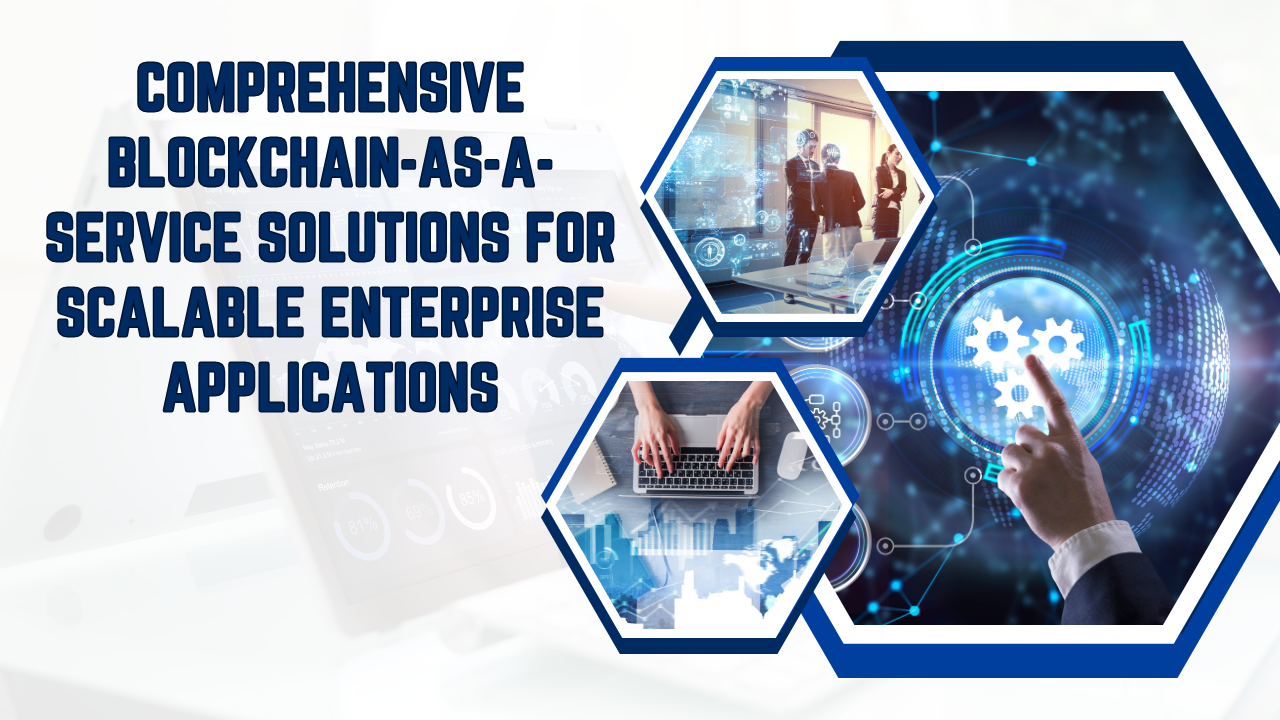Blockchain technology has emerged as a groundbreaking solution for a wide range of industries. Yet, the complexity of implementing and managing blockchain infrastructure has been a significant barrier to adoption for many businesses. Blockchain-as-a-Service (BaaS) addresses this challenge by providing a managed platform that simplifies blockchain integration. In this article, we’ll delve into the intricacies of BaaS, its benefits, applications, scalability solutions, and how enterprises can leverage it for scalable, efficient applications.
What is Blockchain-as-a-Service (BaaS)?

Blockchain-as-a-Service is a cloud-based offering that enables businesses to create, host, and manage blockchain applications without having to build and maintain the underlying infrastructure. Similar to Software-as-a-Service (SaaS), BaaS allows enterprises to access blockchain technology on a subscription basis.
By outsourcing the technical complexities to BaaS providers, companies can focus on developing blockchain solutions tailored to their needs, making it easier to adopt this transformative technology.
Why BaaS is Essential for Enterprises
Enterprises often face challenges such as high costs, technical expertise requirements, and scalability issues when implementing blockchain. BaaS addresses these concerns by offering:
- Simplified Setup: Pre-configured tools and templates for quick deployment.
- Cost Efficiency: Eliminating the need for on-premises blockchain infrastructure reduces expenses.
- Scalability: On-demand resources ensure applications can grow with business needs.
- Enhanced Security: Managed services include robust security protocols, ensuring data integrity.
Core Components of BaaS Solutions
Blockchain Infrastructure
BaaS platforms provide a fully managed environment that includes nodes, consensus mechanisms, and storage. Enterprises can deploy and manage blockchain networks without delving into the intricacies of infrastructure setup.
Smart Contracts
Smart contracts are automated agreements that execute predefined actions based on specific conditions. BaaS platforms simplify the creation, deployment, and management of these contracts, making processes more efficient.
APIs and SDKs
Application Programming Interfaces (APIs) and Software Development Kits (SDKs) offered by BaaS providers allow seamless integration with existing enterprise systems. These tools ensure that blockchain applications can interact with other software effortlessly.
Monitoring and Analytics
Advanced analytics dashboards provided by BaaS platforms help enterprises monitor the performance and security of their blockchain networks.
Benefits of BaaS for Enterprises
Cost Savings
Implementing a blockchain solution in-house requires significant investment in hardware, software, and skilled personnel. BaaS eliminates these costs, offering an affordable subscription-based model.
Faster Time-to-Market
With pre-configured environments and templates, businesses can quickly deploy blockchain applications, reducing development timelines.
Enhanced Security
BaaS platforms use advanced encryption and secure consensus mechanisms, ensuring that enterprise data is protected from breaches and tampering.
Focus on Core Business
By outsourcing blockchain management, enterprises can concentrate on their core competencies rather than getting bogged down by technical details.
Applications of Blockchain in Enterprises
Supply Chain Management
Blockchain enables end-to-end visibility and traceability in supply chains. Enterprises can track products from production to delivery, ensuring authenticity and reducing fraud.
Financial Services
The financial industry benefits significantly from blockchain’s transparency and security. BaaS facilitates secure cross-border payments, fraud prevention, and faster settlements.
Healthcare
Blockchain safeguards sensitive medical data by ensuring secure storage and sharing across providers. This reduces errors and enhances patient privacy.
Identity Management
Blockchain-based identity systems provide a tamper-proof way to verify user identities, reducing fraud and improving efficiency in sectors like banking and government.
Real Estate
Blockchain streamlines property transactions by automating contract execution and reducing the need for intermediaries.
Scalability Challenges in Blockchain

While blockchain offers immense potential, scalability remains a significant hurdle. Traditional blockchains often struggle with:
- Low Transaction Speeds: Public blockchains like Bitcoin and Ethereum have limited transaction throughput.
- Network Congestion: A surge in transactions can overwhelm the network, causing delays.
- High Costs: Increased demand leads to higher transaction fees.
Solutions for Blockchain Scalability
Layer 2 Solutions
Layer 2 technologies, such as payment channels and rollups, process transactions off-chain, reducing the burden on the main blockchain. Examples include the Lightning Network for Bitcoin and Optimistic Rollups for Ethereum.
Sharding
Sharding divides the blockchain into smaller, manageable segments called shards. Each shard processes a portion of the network’s transactions, increasing efficiency.
Sidechains
Sidechains operate alongside the main blockchain, handling specific tasks or applications. They improve scalability while maintaining the security of the primary network.
Consensus Mechanism Upgrades
Switching to more efficient consensus mechanisms, such as Proof of Stake (PoS) or Delegated Proof of Stake (DPoS), can enhance scalability by reducing energy consumption and transaction processing times.
Key Features of Enterprise-Grade BaaS Solutions
Customization
Enterprise-grade BaaS platforms offer tailored solutions to meet the specific needs of different industries, from healthcare to logistics.
Regulatory Compliance
BaaS providers ensure that their platforms comply with local and global regulations, making it easier for businesses to adopt blockchain while remaining compliant.
Interoperability
BaaS solutions are designed to integrate seamlessly with existing enterprise systems, including ERP, CRM, and legacy software.
High Availability
BaaS platforms provide reliable uptime and disaster recovery solutions, ensuring uninterrupted operations.
Leading Providers of BaaS Solutions
Microsoft Azure Blockchain Services
Azure offers a comprehensive suite of tools for creating and managing blockchain networks. It supports multiple frameworks, including Ethereum and Corda.
IBM Blockchain Platform
IBM is a leader in enterprise blockchain solutions, focusing on industries like supply chain and finance. Its platform is built on Hyperledger Fabric, offering robust security and flexibility.
Amazon Managed Blockchain
Amazon’s service simplifies the deployment of scalable blockchain networks using frameworks like Ethereum and Hyperledger Fabric.
Hyperledger Fabric
An open-source platform, Hyperledger Fabric is highly customizable and suitable for various enterprise applications, from finance to healthcare.
Corda
Corda specializes in solutions for regulated industries like finance and healthcare, focusing on privacy and scalability.
Steps to Implement BaaS in Enterprises
Identify Use Cases
Start by identifying areas where blockchain can add value, such as improving transparency or automating processes.
Choose the Right Provider
Evaluate providers based on their offerings, reputation, and compatibility with your business needs.
Integrate with Existing Systems
Work with the BaaS provider to ensure seamless integration with your current software and processes.
Test and Scale
Deploy the solution on a smaller scale, gather feedback, and optimize before rolling it out across the organization.
Future of Blockchain-as-a-Service

The future of BaaS lies in its integration with emerging technologies like Artificial Intelligence (AI) and the Internet of Things (IoT). These integrations will enable more intelligent and automated blockchain applications, further enhancing efficiency.
Decentralized Applications (dApps)
BaaS will drive the development of dApps, which provide decentralized solutions for various industries, from gaming to finance.
Mainstream Adoption
As BaaS becomes more accessible and affordable, we can expect widespread adoption across industries, including smaller businesses and startups.
Enhanced Interoperability
Future BaaS platforms will focus on interoperability, allowing different blockchain networks to communicate and collaborate seamlessly.
Conclusion:
Blockchain-as-a-Service is revolutionizing how enterprises adopt and scale blockchain technology. By simplifying the deployment process and providing managed solutions, BaaS enables businesses to leverage blockchain’s transformative potential without the associated complexities. As the technology continues to evolve, its applications will expand, driving innovation across industries.
FAQs
What is the key advantage of BaaS for enterprises?
BaaS simplifies blockchain adoption, reducing the need for in-house expertise and infrastructure.
How does BaaS enhance security?
BaaS platforms use advanced encryption and consensus mechanisms to ensure data integrity and prevent unauthorized access.
Can small businesses benefit from BaaS?
Yes, BaaS is cost-effective and scalable, making it accessible for businesses of all sizes.
What industries use BaaS the most?
Finance, healthcare, supply chain, and real estate are among the top industries leveraging BaaS.
What’s the future of Blockchain-as-a-Service?
The integration of blockchain with AI, IoT, and decentralized applications will drive innovation and mainstream adoption in the coming years.
